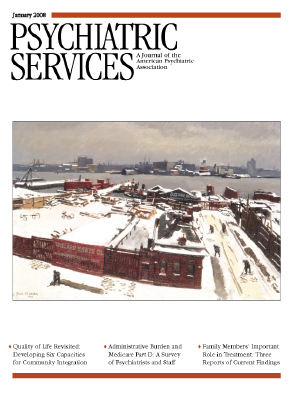The recovery concept has taken hold among stakeholders involved in the treatment of mental illness—consumers, providers, advocacy groups, and policy makers. In the lead article in this issue, Ware and colleagues remind us that attention to recovery, as well as its meaning, focus, and measurement, has changed, often dramatically, over the past 40 years. From an initial concern with symptom reduction and rehospitalization rates, "outcomes" were transformed into concepts and measures surrounding quality of life. The focus on quality of life was waylaid by fiscal problems. Now, the recovery umbrella—or "procovery," a term coined by Kathleen Crowley—brings back into focus ideas such as partnership, empowerment, and integrated services and adds moral and social concerns, such as hope, as critical outcomes. In short, this movement says that a better life is possible for people with serious mental illness and that systems of care should be prepared to help them pursue it.
Making that pursuit a reality in treatment facilities and in the community continues to raise challenges. Ware and colleagues offer a fresh look at how recovery can be understood and made real. There are two central parts to their effort. First, they ask about what constitutes a good and meaningful life for all persons in contemporary society, not just for individuals with mental illness. They focus on dual, complex issues of social integration and citizenship. Second, they take a novel approach, using well-established inductive methods, to understand the real-life components that constitute the life of a person who is "in recovery."
Ware and colleagues lay out six personal capacities, which—rather than simply listing services (housing, employment, and so forth) to guide treatment systems and providers—serve to outline capabilities and to describe mechanisms to develop them. Targeting the development of opportunities allows individuals inside and outside the treatment sector to understand goals and processes. It also provides a real, sophisticated blueprint to shape mental health care and community living. It escapes the charges of paternalism or coercion that have been leveled against important program innovations, without suggesting that key processes are always pleasant (for example, confrontation).
This combination of rights and obligations stands at the center of what philosophers and social scientists have understood to be the critical aspects of community life for all individuals. This blueprint represents only the beginning of a mental health system that understands how the delivery of medical treatment and services, aligned with activities that support moral and social growth, can achieve the goals of recovery—a better life.

